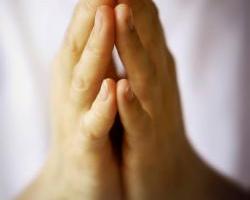Many of the obsessions or compulsions that manifest for OCD patients can be religious in nature. Someone who is religious or was raised in a theological environment may manifest obsessions and/or compulsions that are religious in nature. Because OCD usually affects those things most deep-seeded in our psyche (things that we feel are "right or wrong"), religion quite often plays a role in OCD. In the United States, the most common religion is on of several sects of Christianity.
So, for Christians, common issues have been noted about how they may react to OCD through their religious beliefs.
Religious obsessions often center on:
* A belief that the person has sinned or otherwise broken religious law.
* Questions about past or present prayers or religious meditations and whether they were "impure" or insincere.
* Repetitive blasphemous thoughts.
* Feeling "unworthy" of salvation.
* Intrusive sexual thoughts about God, Jesus, saints, or other religious figures. This is a combination of two of the most deep-seeded beliefs in most Christians - sexuality and God.
* Obsessions about inappropriate things during prayer or meditation.
* Fear that one's religious practice is not "perfect" and therefore is impure before God.
Obviously, the more orthodox the person's beliefs, the more likely they are to obsess about them.
Compulsions in relation to Christian religion and OCD often take the form of:
* Repeating prayers for fear that they have not been done correctly and must be repented.
* Compulsions to say or do blasphemous things during religious ceremony or worship.
* Mortification of the flesh (self-harm) in a repeated, health-threatening way.
* Acting out on beliefs of possession.
Some compulsions can become externally focused - aimed at others rather than oneself. These compulsions can become quite serious and mean legal consequences for the OCD patient. Most of the time, however, religion-based compulsions are aimed at the self rather than others and are dangerous only to the patient.
The best treatment for religion-centered OCD is to combine professional counseling and neurological treatment with counseling and one-on-one religious conversation with clergy. In this way, the patient's faith and beliefs are not sacrificed and can be turned towards the good work of healing the patient instead.
Whatever you do, do not forsake yourself or God because of your obsessive-compulsive disorder. Get help.








